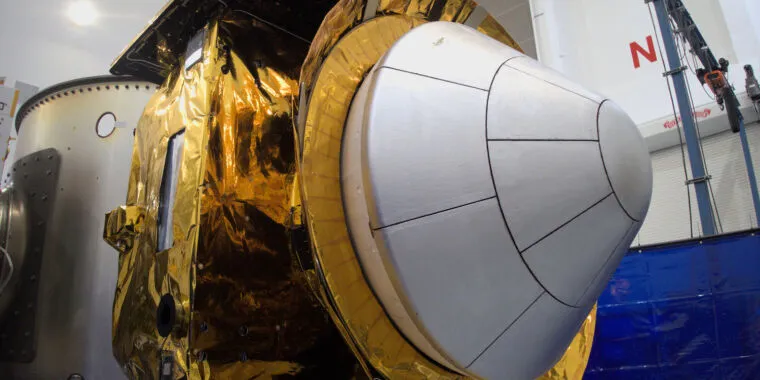I’d seen the story about a spacecraft making a drug in microgravity and planning to land it in the US.
However, the recovery of Varda’s capsule is on hold after the Federal Aviation Administration and the US Air Force recently declined to give Varda approval to land its spacecraft in a remote part of Utah. TechCrunch first reported the FAA turned down Varda’s application for a commercial reentry license.
“Varda Space Industries launched its vehicle into space without a reentry license,” an FAA spokesperson told Ars on Wednesday. “The FAA denied the Varda reentry license application on September 6 because the company did not demonstrate compliance with the regulatory requirements.”
the company will continue to work with its “government partners to bring our capsule back to Earth as soon as possible.”
What does this involve? They obviously can’t make any hardware changes to the spacecraft at this point. Software / flight profile changes? Modifications to ground support and recovery procedures?
Probably trying to find a way to safely crash it, hopefully in a way they can recover the space drugs.
Oops!
Hate when that happens.
The title here is definitely misrepresenting the situation. Varda is the first company to try to get a reentry license from the FAA through Part 450, which was supposed to streamline things. They’ve been working on it for awhile.
I don’t know whether the lesson learned will be to get your reentry license for this kind of thing before launch or some design flaw or something, but it sucks to be stuck.
If a desert landing is a non-starter for some untold reason, I wonder if they’d be able to do an ocean recovery? I’m guessing that would be a last resort for Varda because of the extra damage it would do to the capsule.
I chose the title because I thought and hoped it’s a reasonable inference.
As an example, the first time I booked my own air flight – actually, every time – I made sure it was a ticket for the days and places I want, and that I got to my home at the end.
Do you know more about this Varda licensing situation? Is it possible to get a re-entry licence before launch? If they could have, they’re incompetent not to. If not, that seems like a ridiculous regulation, requiring someone to launch with no confidence that they can legally come back (and possibly still incompetence on Varda’s part for not making sure all the conditions were going to be met).
No idea, but it’s a new process. Here’s an article from late July about the same issue:
https://spacenews.com/varda-waiting-on-faa-license-to-return-space-manufacturing-capsule/
I mean just land somewhere else.
It doesn’t matter where they land as the Chicago Convention states that the laws of the country that the craft is registered still applies.
deleted by creator
You aren’t allowed to go over red lights yet many people still do.
And “people” aren’t corporations at risk of the FAA issuing six figure fines, potential jail time, and seizing their vessel.
And who is gonna stop them from reentry? Anti gravity?
As You999 put it, “the laws of the country that the craft is registered still applies”. I hadn’t heard the term “the Chicago Convention”. I’ve heard only “The Outer Space Treaty”, or formally Treaty on principles governing the activities of states in the exploration and use of outer space, including the moon and other celestial bodies. Specifically Article VIII:
A State Party to the Treaty on whose registry an object launched into outer space is carried shall retain jurisdiction and control over such object, and over any personnel thereof, while in outer space or on a celestial body. Ownership of objects launched into outer space, including objects landed or constructed on a celestial body, and of their component parts, is not affected by their presence in outer space or on a celestial body or by their return to the Earth. Such objects or component parts found beyond the limits of the State Party of the Treaty on whose registry they are carried shall be returned to that State Party, which shall, upon request, furnish identifying data prior to their return.
Could Varda actually land the capsule? I presume so (the whole thing is a moot point if they can’t). Would the FAA (and, for all I know, other agencies) land on them like a pile of bricks? I certainly hope so!
I guess you can “leave one up there.”
Launches are optional, landings are… also optional.
landings are… also optional.
Within certain parameters, yeah? If it’s low enough it’ll land eventually.
Atmosphere yes, ground maybe.


